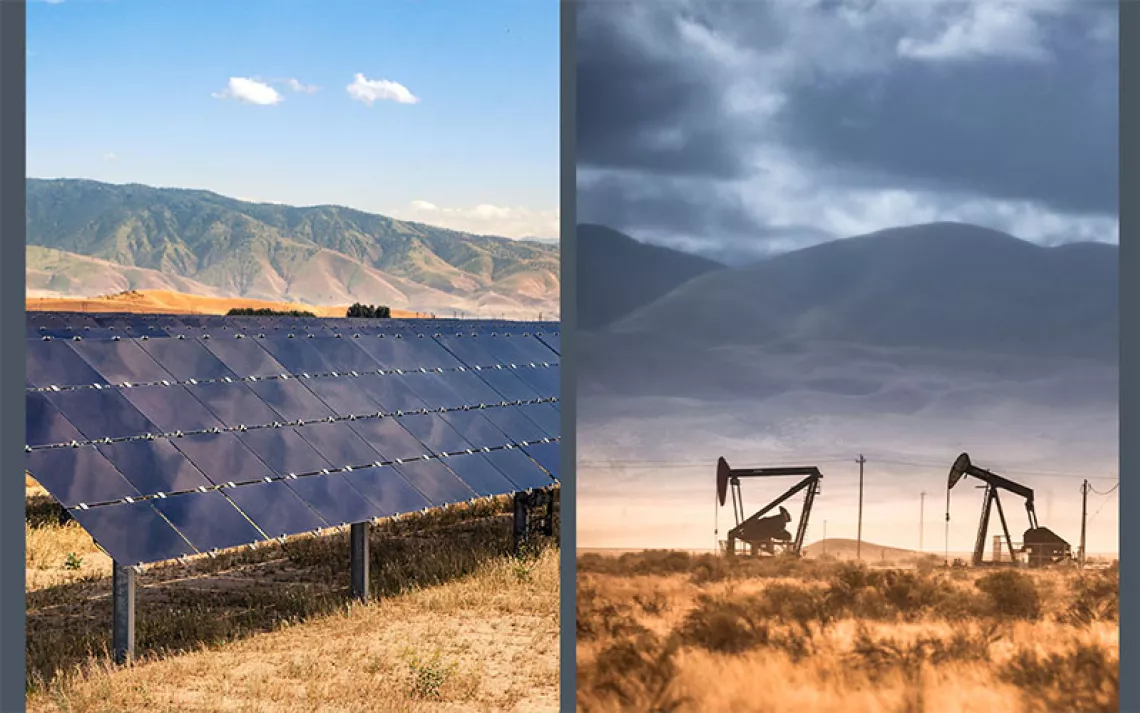No Blood OR Oil
A rare political alignment offers an unmatched moment to finally break our addiction to fossil fuels

Photo by AP Photo/Pat Wellenbach
Across-the-board bipartisanship in Washington is as rare and stunning as a rainbow, so it’s good to pay attention when it happens. Just about everyone—from Trump stalwarts like Senators Tom Cotton and Lindsey Graham to progressive champions like Representatives Ro Khanna and Pramila Jayapal—supports cutting Russian oil imports to counter Vladimir Putin’s criminal invasion of Ukraine. There’s universal agreement that oil is Putin’s Achilles' heel.
I keep thinking back to another moment, nearly 20 years ago, when millions of Americans made the connection between war and fossil fuels.
Maybe you were there and remember it too. In February 2003, millions of people across the United States marched against President George W. Bush’s plan to invade Iraq. Many of us in the streets carried signs and banners that read “No Blood for Oil.” It was a demand anchored in anger over how a preoccupation with the oil-rich Middle East has warped US foreign policy. In four short words, that slogan called for bolstering US security and global peace by reducing our dependence on the dark lifeblood of industrial society: oil and gas.
Those were heady days for the American peace and justice movement. The New York Times declared “world public opinion” a second “superpower”—the only force capable of frustrating the militarism of Bush’s oil-patch cabinet. Anti-war members of Congress were calling for a rethinking of US energy policies. The phony WMD smokescreen aside, it seemed obvious enough that the US wouldn’t be invading Iraq if its number one export were figs (to borrow from Republican senator Chuck Hagel).
The Bush administration steamrolled the peace movement and marched into Baghdad. By the end, there was much blood: a half million Iraqis were dead, more than 30,000 US troops wounded and killed. And Americans went on guzzling oil, buying SUVs, and building McMansions. For the remainder of the aughts and well into the teens, mainstream political conversation in the United States continued to ignore how oil dependence threatens global peace and security.
Prognostication is a fool’s craft; Big Oil’s obituary has been written many times before. But this moment feels different. We’re now facing as good a chance as ever to once and for all kick our oil addiction.
It’s time to update the “No Blood for Oil” slogan to “No Blood or Oil.” This is the opportunity to make the case that a global economy fueled by renewable energies is the smartest path toward peace, security, community well-being, and a livable planet.
We’re in a moral moment, and such moments can make for unusual alignments of political interests. Russia’s murderous aggression might be the thing to unite foreign policy hawks and longtime doves, Bernie bros and Wall Street bankers, anti-fascist progressives and faithful conservatives, deep greens and eco-modernists in a collective call for international security and global sustainability based on decarbonization. As Senator Elizabeth Warren said last week, "If a moment like this with Russia doesn't remind us why we need to get off fossil fuels, then I just don't know what it's going to take."
What makes this moment different from that flash of optimism nearly 20 years ago on the eve of the Iraq invasion?
First, this time the United States isn’t the aggressor but instead can stand as a defender of peace and freedom. During the George W. years, it was embarrassing for Republicans and other members of the establishment (including many Democrats) to acknowledge the twisted connections between global energy supplies and US foreign policy. After all, they were accomplices and enablers. Today, with Russian forces blowing up children’s hospitals and maternity wards, Republicans can freely admit how a despot like Putin uses oil as both ATM and cudgel. “This is not a partisan issue,” Representative Nancy Mace, a Republican from South Carolina, said recently. “I don’t know a single American who wants to put one gallon of Russian gas into their car when they fill up.” Seven out of 10 Americans say they support the new ban on Russian oil—even if it leads to higher prices.
Twenty years ago, US foreign policy was focused on sustaining the oil supply. Today, US foreign policy is informed by reducing oil demand. President Joe Biden nailed it on Tuesday when he said the Russian invasion of Ukraine “should motivate us to accelerate the transition to clean energy.… That’ll mean tyrants like Putin won’t be able to use fossil fuels as weapons against other nations.”
The second big difference between 2003 and 2022 is the intensity of the climate crisis. Twenty years ago, climate was a fringe issue. (The Sierra Club didn’t make climate change a top priority until 2005; An Inconvenient Truth came out in 2006.) In 2022, climate chaos is right in our faces. The cutting edges of technology, finance, and social-change activism are in the climate-action arena. The best recent analog to the February 2003 global peace protests was the September 2019 youth-led day of action for climate progress—probably the largest coordinated day of citizen protest in world history. These days, the number one concern of the “superpower” of world public opinion is climate chaos.
Back in 2003, “No Blood for Oil” was a radical idea. In 2022, “No Blood or Oil” is already in the cultural and political bloodstream. The kids and the climatologists are screaming for society to kick its hydrocarbon habit. Europe was on a path to decarbonization well before Putin began massing his forces at the Ukraine border. Now, Europe’s resolve to stand up to Russia is accelerating a process that was already in motion. “The stuff coming out of the mouths of European leaders has never come out of their leaders’ mouths before,” Nikos Tsafos, an energy analyst at the Center for Strategic and International Studies, told Scientific American.
For climate activists, the Western democracies’ commitment to combat Russian aggression with oil sanctions represents a “movement moment.” It’s a moment when unforeseen events open up new space for rapid social changes. Something that would have seemed unimaginable just a few years ago—like, say, a US president linking tyranny to oil—becomes reality. This particular movement moment has an advantage hardly anyone dreamed of 20 years ago: technological feasibility.
Breaking the power of petro-autocrats like Putin (or the House of Saud) by getting off of oil isn’t just the right thing to do. It’s the doable thing to do. In the past 20 years, the costs of renewable energies have plummeted, and their share of the energy-generation pie has skyrocketed. In 2003, wind energy was less than one-third of 1 percent of total US electricity generation; now, it’s around 9 percent. Back in the George W. days, it cost as much as $15/watt to install rooftop solar. Today, it’s around $1.50/watt. EVs were barely a thing back in 2003; today, electric vehicles are the hot new thing.
The geopolitical, technological, and partisan stars may be briefly aligned for now. But there’s no guarantee we’ll convert on this movement moment. The Carbon Barons are already lobbying for more oil and gas extraction as a response to Russia’s war. The fossil fuel shills on Capitol Hill are trying to resurrect their own 2000s throwback: “Drill, Baby, Drill.” And even as Republicans support cutting off Russian imports, they’ve shown themselves quite happy to use rising oil prices to batter the White House—regardless of the facts.
All of which is to acknowledge that there are real risks to an emergency retreat from fossil fuels. Having procrastinated on launching a managed energy transition, we’re now facing the prospect of an unmanaged and chaotic energy transition. The biggest threat is a spike in fuel and energy prices—a spike even greater than what we’ve seen so far. That could spark a populist backlash like France’s “Yellow Vest” movement of 2018.
Americans have an almost totemic relationship to gasoline prices. It is, famously, the only commodity whose cost is blared from nearly every major intersection—a supposed indicator of economic well-being, towering up in the air. On cable news this week, the talking heads are tracking the average price of a gallon of gasoline with a mortician’s air. Americans say they’re willing to pay some of the price for Ukrainian freedom, but there’s likely an upward limit to their perseverance.
As a matter of both politics and economic fairness, it’s imperative to find a way to let gasoline prices rise—and allow demand to sink—while also insulating American families from price shocks. Senators Elizabeth Warren and Sheldon Whitehouse are working on legislation that would do just that. Their proposal would levy a windfall profits tax on oil companies. Since there’s a danger that companies might try to pass the tax along to consumers in the form of higher prices, the legislation would use the revenues to provide quarterly rebates to families earning less than $150,000 a year. This would pack a one-two punch of discouraging Big Oil from engaging in war profiteering while also cushioning the blow of rising fuel prices. That idea is the perfect companion to legislation proposed by Senators Ed Markey and Martin Heinrich that would mandate replacing Russian energy imports with renewable sources.
If Congress is truly serious about lasting energy independence and finally decoupling US foreign policy from our oil and gas appetites, the easiest and quickest thing to do is pass the climate and energy provisions of Biden’s Build Back Better agenda. The $550 billion of climate-related funding in the Biden plan includes incentives for electric-vehicle buyers and increased monies for EV infrastructure. You want to get Putin out of the driver’s seat? Electrify the US auto fleet.
Climate activists have been saying for years that avoiding the worst effects of global warming will take nothing less than a wartime mobilization on par with the US retooling during World War II. A war is now underway in Europe. This is the moment to mobilize.
 The Magazine of The Sierra Club
The Magazine of The Sierra Club



